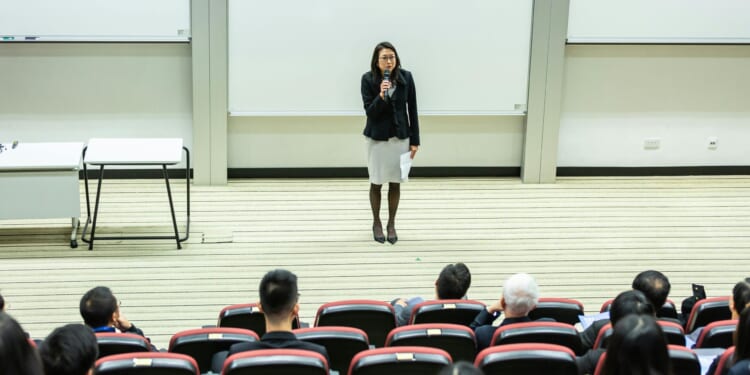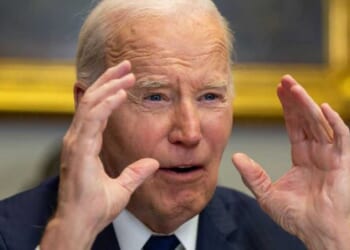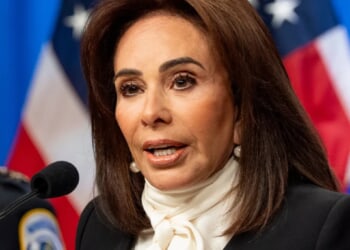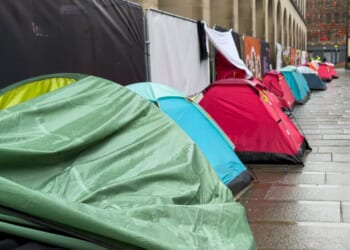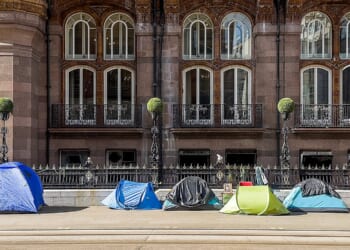A group of higher education associations is trying to get special treatment from the Department of Homeland Security (DHS) so they can bypass the new $100,000 H-1B visa application fee and import as many foreigners as they want to.
In a letter to DHS Secretary Kristi Noem, the American Council on Education, American Association of Colleges for Teacher Education, American Association of Colleges and Universities, and the American Association of University Professors, along with nearly 30 others organizations, asked to be exempt from the Trump administration’s new $100,000 application fee, claiming the cost would stand as a major barrier to recruiting and retaining foreign faculty, researchers, and staff.
“Given the fact that H-1B beneficiaries working at our institutions train and educate domestic students for these high-demand occupations, conduct essential research, provide critical patient care, and support the core infrastructure of our universities, we therefore ask that higher education be considered exempted from the $100,000 fee requirement,” Ted Mitchell, president of the American Council on Education, wrote in the letter. “H-1B visa holders working for institutions of higher education are doing work that is crucial to the U.S. economy and national security.”
In September, President Donald Trump signed an executive order putting the application fee on new applicants after Sept. 21, which must be paid when the petition for a visa is filed. Many conservatives said the move did not go nearly far enough. According to guidance from U.S. Citizenship and Immigration Services (USCIS), the fee would not apply to those currently holding H-1B visas or renewals, even if they are outside the United States and trying to reenter — exceptions that dilute the effectiveness of the fee.
As The Federalist reported, Americans are not content merely with deporting illegal immigrants. Many Americans want every illegal alien gone, no matter the circumstance, and a significant number of Americans want to cycle out the millions who have received various visas or been granted asylum on bogus claims, while denaturalizing those who posture themselves as enemies of the United States.
The higher education organizations say their foreign employees should be granted exceptions to the fee because they meet the “extraordinarily rare circumstance where the Secretary has determined that a particular alien worker’s presence in the United States as an H-1B worker is in the national interest.”
Their proof is that 70 percent of them hold tenured or tenure-track positions, and that the “top five disciplines “employing H-1B recipients are “business (13.6 percent), engineering (12.3 percent), health professions (9.2 percent), computer science (9.1 percent), and physical sciences (7.2 percent).”
The reality, however, is that each H-1B recipient is taking the place of an American who deserves that job more by virtue of being an American. Importing foreign workers in any capacity, if the country chooses to do it at all, should only be done under dire circumstances, after all options are exhausted, in cases where a gap truly cannot be filled by an American.
The claim is also laughable considering the fact that universities were abusing the H-1B visa program to import foreigners to become diversity, equity, and inclusion (DEI) bureaucrats and tell Americans they are racist while co-opting the American story and experience, as The Federalist reported.
Mitchell’s letter also sought to clarify whether the USCIS guidance includes recipients of F-1 or J-1 visas, which are given to foreign students, if they convert to H-1B work visas, as well as whether the fee will be returned if an H-1B application is denied.
What the universities are asking for is not without precedent, however, considering universities have typically been exempted from the H-1B lottery yearly cap, which places a limit of 65,000 H-1B workers (plus 20,000 individuals who have earned advanced degrees from a U.S. institution) on other organizations looking to hire these foreign workers.
It is up to the Trump administration not to cave and allow institutions that have done so much systematic damage to the country to keep importing foreigners into the country.
On Wednesday, Gov. Ron DeSantis, R-Fla., said Florida was going to “pull the plug” on visas for foreigners seeking to work at public universities.
“Universities across the country are importing foreign workers on H-1B visas instead of hiring Americans who are qualified and available to do the job. We will not tolerate H-1B abuse in Florida institutions. That’s why I have directed the Florida Board of Governors to end this practice,” he said. “Florida leads the nation in higher education, and thousands of highly qualified Americans graduate from our colleges and universities every year. If any universities are truly struggling to find U.S. citizens to fill their job openings, they ought to evaluate their academic programs to determine why they cannot produce graduates who can be hired for these positions.”
DeSantis also noted a problem with the argument that these are “highly specialized” or “elite” positions, stating that an audit done in Florida showed assistant athletic coach and media relations specialist positions being filled with H-1B recipients.
While the H-1B program needs to be cleaned up and significantly curtailed — or even abolished — there is no room in America to give institutions of higher education, which have consistently proven their disdain for the country, special treatment.
Breccan F. Thies is the White House correspondent for The Federalist. He previously covered education and culture issues for the Washington Examiner and Breitbart News. He holds a degree from the University of Virginia and is a 2022 Claremont Institute Publius Fellow. You can follow him on X: @BreccanFThies.

